Unit 12 You’re supposed to shake hands.(Section B 3a and Reading)
文档属性
| 名称 | Unit 12 You’re supposed to shake hands.(Section B 3a and Reading) |
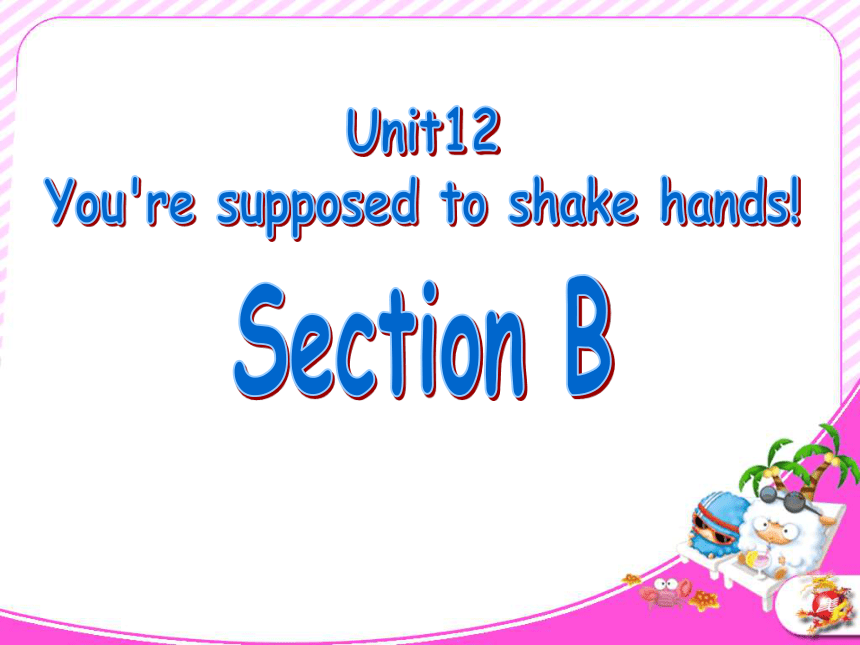
|
|
| 格式 | zip | ||
| 文件大小 | 474.7KB | ||
| 资源类型 | 教案 | ||
| 版本资源 | 人教新目标(Go for it)版 | ||
| 科目 | 英语 | ||
| 更新时间 | 2012-05-25 00:00:00 | ||
图片预览

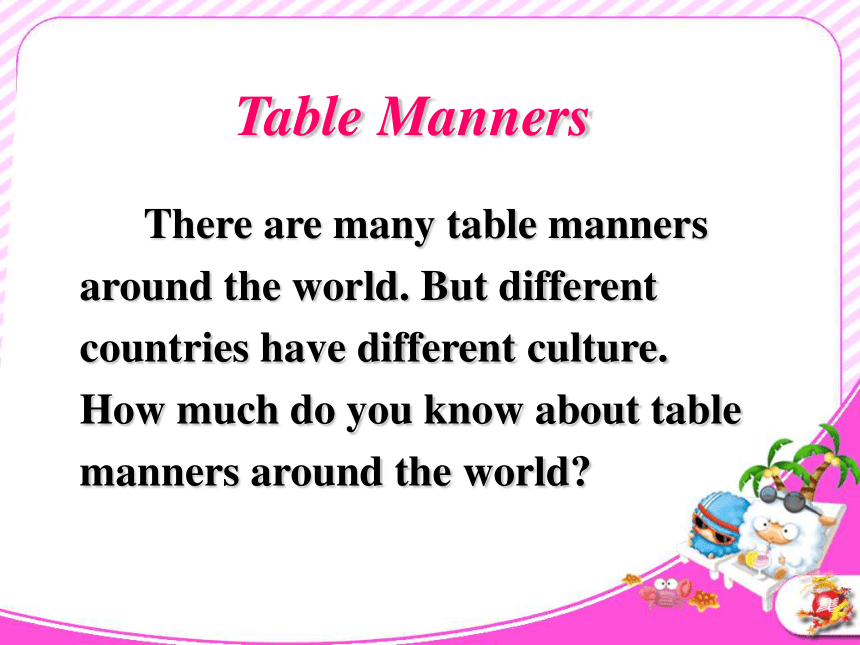
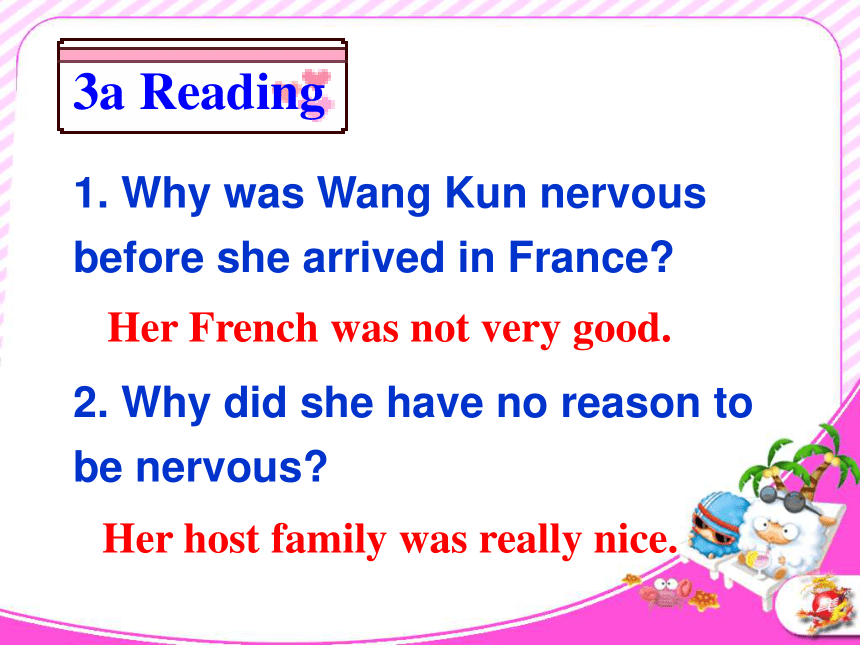
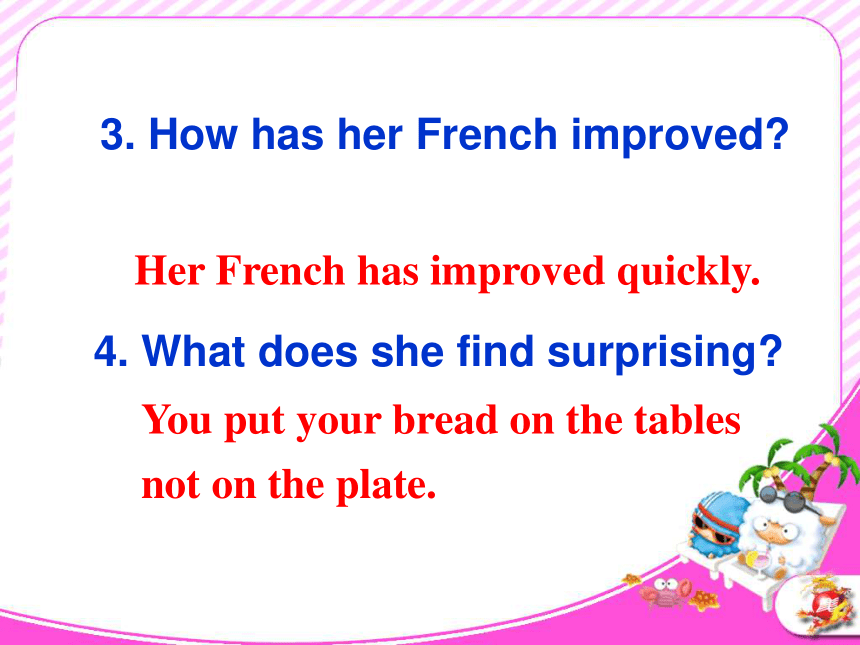
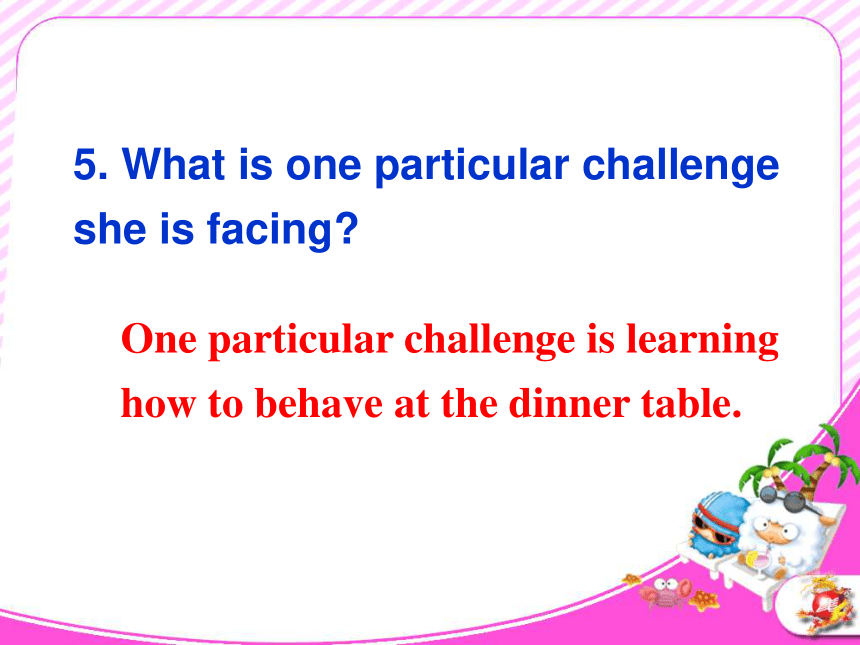
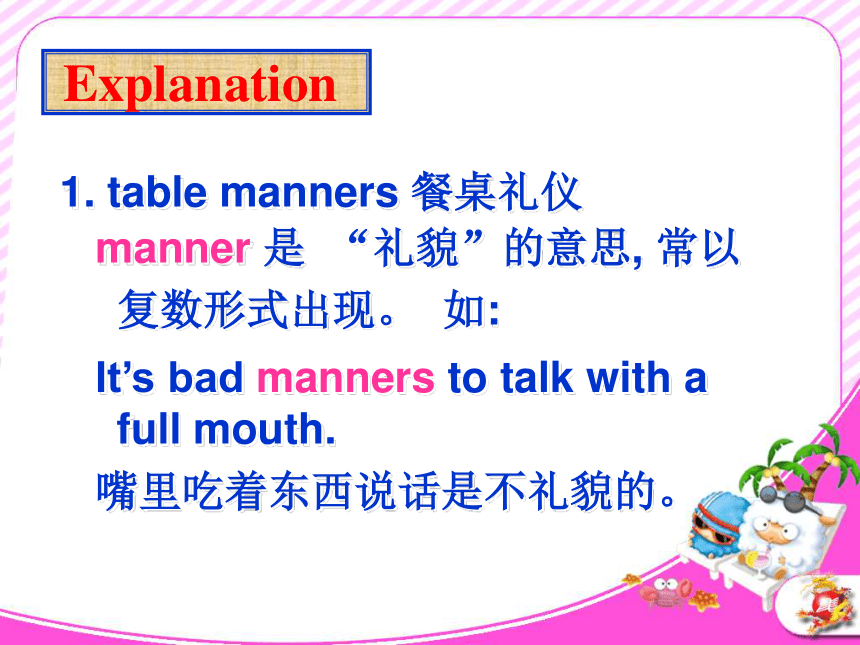
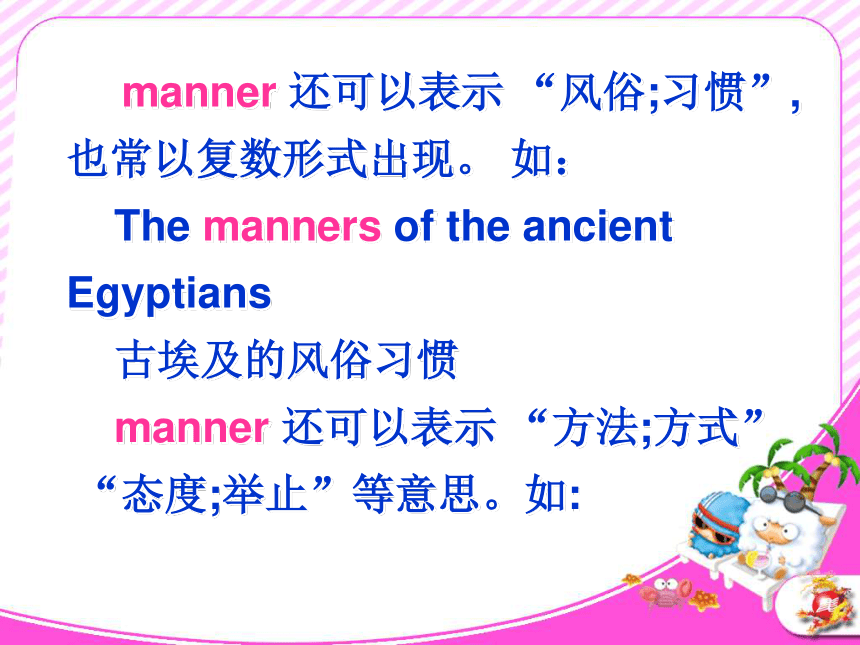
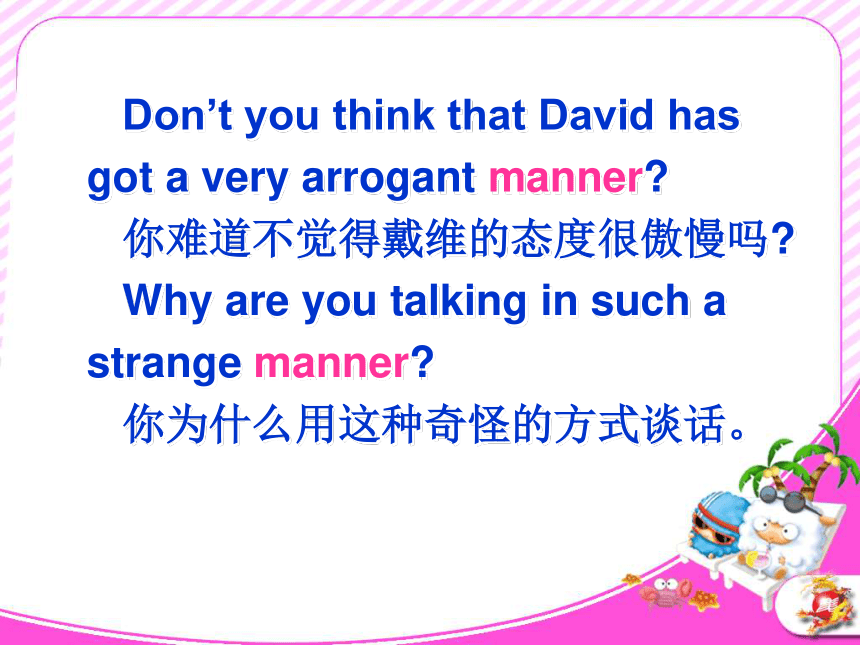
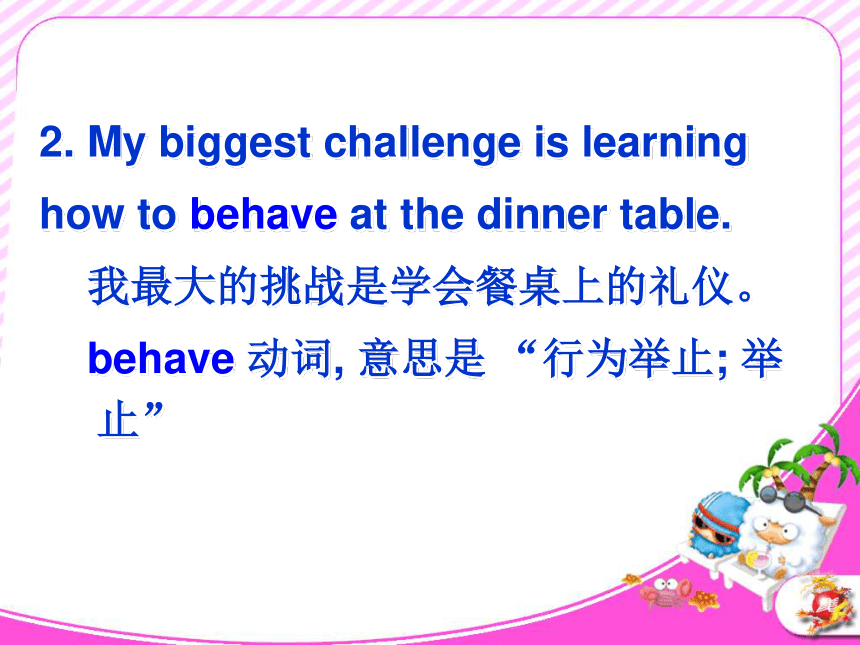
文档简介
(共28张PPT)
Table Manners
There are many table manners
around the world. But different
countries have different culture.
How much do you know about table manners around the world
1. Why was Wang Kun nervous before she arrived in France
Her French was not very good.
3a Reading
2. Why did she have no reason to be nervous
Her host family was really nice.
3. How has her French improved
Her French has improved quickly.
4. What does she find surprising
You put your bread on the tables not on the plate.
5. What is one particular challenge she is facing
One particular challenge is learning how to behave at the dinner table.
1. table manners 餐桌礼仪
manner 是 “礼貌”的意思, 常以复数形式出现。 如:
It’s bad manners to talk with a full mouth.
嘴里吃着东西说话是不礼貌的。
Explanation
manner 还可以表示 “风俗;习惯”,
也常以复数形式出现。 如:
The manners of the ancient Egyptians
古埃及的风俗习惯
manner 还可以表示 “方法;方式”
“态度;举止”等意思。如:
Don’t you think that David has got a very arrogant manner
你难道不觉得戴维的态度很傲慢吗
Why are you talking in such a strange manner
你为什么用这种奇怪的方式谈话。
2. My biggest challenge is learning
how to behave at the dinner table.
我最大的挑战是学会餐桌上的礼仪。
behave 动词, 意思是 “行为举止; 举止”
The boy behaved very well last night.
孩子昨天晚上表现挺好。
The teacher encouraged the children to behave well and not to be a discredit to the collective.
老师鼓励孩子们表现得好一些,不要给集体丢脸。
The little boy behaved with great encourage in the face of gunman.
在持枪歹徒面前,这个小男孩表现得极有勇气。
它还可以表示 “守规矩;举止适当有礼”的意思。如:
Please behave yourself. 请礼貌点儿。
Will you children please behave!
你们这些孩子们能不能守规矩点。
它的相应的名词是behavior, 意思
是 “行为”。如:
3. ...but I am used to it.
词组 get/be used to 意思是 “习惯
于……”词组中的 to 是介词 其后如果
跟动词 动词应该用动名词形式。
The astronauts soon got used
to the condition of weightlessness
太空人很快就习惯了失重状态。
I’m getting used to the cold weather.
我开始习惯寒冷的天气。
She gets used to driving a small car.
她习惯开一辆小车。
He will get used to getting up early.
他将习惯于早起。
Manners in Japan! Please fill in the blanks.
You aren’t supposed to _____________.
You shouldn’t _____________________.
It’s rude ________________________.
It’s polite _______________________.
eat or drink while walking down the street
point at anyone with your chopsticks
to stick your chopsticks into your food
to make noise while eating noodles
Read the e-mail and make a list of table manners in France!
You aren’t supposed to … You are supposed to…
put your bread on your plate.
put it on the table.
eat anything with your hands except bread.
cut fruit up and eat it with a fork.
say you are full.
say “It was delicious.”
put your hands in your lap.
keep your hands on the table.
Now you are a Chinese guide, a group of visitors from the USA are coming.
Make a list of things people are supposed to do in different situations!
Fill in the blanks in self-check 1.
Write an e-mail to solve Fan Ling’s problems!
1.When you are invited to dinner by Americans, the hostess expects you to be there on time or not more than a few minutes later.
2.When the guests sit down at a dinner table, it is common for the men to help ladies by pushing their chairs under them. Some families have a habit of offering a prayer of thanks before they eat.
3.Europeans keep the knife on the right hand, the fork on the left. But Americans use just one hand, and keep the other one on the lap. They constantly change their fork to the left hand when they have to cut meat.
4. You should leave a spoon to lie flat. (a coffee spoon on the saucer, a soup spoon on the service plate beside the soup bowl.)
5.When Americans eat the bread, they hold it in their fingers, usually break it first.
6.If you have to leave during the meal, you should ask the hostess, “Would you please excuse me for a minute ” After the meal, you needn’t fold the napkins unless you are house guests and want to stay for more than one meal.
7.When you leave, it is a custom for you to say: “Goodbye. It was so nice of you to have me.” or “Thank you. I’ve had a nice time.” Then, maybe you can send a thank-you note.
is a new kind of written English that is being used to save time.
meaning
abbreviations
homophone
punctuation marks
types
Can you write an example of each on your own
How R U How are you
CU See you!
BTW By the way.
CUL8r See you later!
BRB
CU2morrow
ASAP
I’ll be right back.
See you tomorrow!
as soon as possible
Please write more expressions like the ones above!
situations
is supposed to be used______________.
is not supposed to be used___________.
on a mobile phone
in class
Complete the chart and discuss your answers with your partner.
Do these two on your own:
1.I had a great weekend. And you
2.Oh no!I am going to be late. My e-mail English ideas
Do them with a partner:
3.I have seen that movie four times. It’s great!
4.Excuse me. Could you please help me Our e-mail English ideas
Find more information about e-mail English.
Write a note to some friends using e-mail English.
Table Manners
There are many table manners
around the world. But different
countries have different culture.
How much do you know about table manners around the world
1. Why was Wang Kun nervous before she arrived in France
Her French was not very good.
3a Reading
2. Why did she have no reason to be nervous
Her host family was really nice.
3. How has her French improved
Her French has improved quickly.
4. What does she find surprising
You put your bread on the tables not on the plate.
5. What is one particular challenge she is facing
One particular challenge is learning how to behave at the dinner table.
1. table manners 餐桌礼仪
manner 是 “礼貌”的意思, 常以复数形式出现。 如:
It’s bad manners to talk with a full mouth.
嘴里吃着东西说话是不礼貌的。
Explanation
manner 还可以表示 “风俗;习惯”,
也常以复数形式出现。 如:
The manners of the ancient Egyptians
古埃及的风俗习惯
manner 还可以表示 “方法;方式”
“态度;举止”等意思。如:
Don’t you think that David has got a very arrogant manner
你难道不觉得戴维的态度很傲慢吗
Why are you talking in such a strange manner
你为什么用这种奇怪的方式谈话。
2. My biggest challenge is learning
how to behave at the dinner table.
我最大的挑战是学会餐桌上的礼仪。
behave 动词, 意思是 “行为举止; 举止”
The boy behaved very well last night.
孩子昨天晚上表现挺好。
The teacher encouraged the children to behave well and not to be a discredit to the collective.
老师鼓励孩子们表现得好一些,不要给集体丢脸。
The little boy behaved with great encourage in the face of gunman.
在持枪歹徒面前,这个小男孩表现得极有勇气。
它还可以表示 “守规矩;举止适当有礼”的意思。如:
Please behave yourself. 请礼貌点儿。
Will you children please behave!
你们这些孩子们能不能守规矩点。
它的相应的名词是behavior, 意思
是 “行为”。如:
3. ...but I am used to it.
词组 get/be used to 意思是 “习惯
于……”词组中的 to 是介词 其后如果
跟动词 动词应该用动名词形式。
The astronauts soon got used
to the condition of weightlessness
太空人很快就习惯了失重状态。
I’m getting used to the cold weather.
我开始习惯寒冷的天气。
She gets used to driving a small car.
她习惯开一辆小车。
He will get used to getting up early.
他将习惯于早起。
Manners in Japan! Please fill in the blanks.
You aren’t supposed to _____________.
You shouldn’t _____________________.
It’s rude ________________________.
It’s polite _______________________.
eat or drink while walking down the street
point at anyone with your chopsticks
to stick your chopsticks into your food
to make noise while eating noodles
Read the e-mail and make a list of table manners in France!
You aren’t supposed to … You are supposed to…
put your bread on your plate.
put it on the table.
eat anything with your hands except bread.
cut fruit up and eat it with a fork.
say you are full.
say “It was delicious.”
put your hands in your lap.
keep your hands on the table.
Now you are a Chinese guide, a group of visitors from the USA are coming.
Make a list of things people are supposed to do in different situations!
Fill in the blanks in self-check 1.
Write an e-mail to solve Fan Ling’s problems!
1.When you are invited to dinner by Americans, the hostess expects you to be there on time or not more than a few minutes later.
2.When the guests sit down at a dinner table, it is common for the men to help ladies by pushing their chairs under them. Some families have a habit of offering a prayer of thanks before they eat.
3.Europeans keep the knife on the right hand, the fork on the left. But Americans use just one hand, and keep the other one on the lap. They constantly change their fork to the left hand when they have to cut meat.
4. You should leave a spoon to lie flat. (a coffee spoon on the saucer, a soup spoon on the service plate beside the soup bowl.)
5.When Americans eat the bread, they hold it in their fingers, usually break it first.
6.If you have to leave during the meal, you should ask the hostess, “Would you please excuse me for a minute ” After the meal, you needn’t fold the napkins unless you are house guests and want to stay for more than one meal.
7.When you leave, it is a custom for you to say: “Goodbye. It was so nice of you to have me.” or “Thank you. I’ve had a nice time.” Then, maybe you can send a thank-you note.
is a new kind of written English that is being used to save time.
meaning
abbreviations
homophone
punctuation marks
types
Can you write an example of each on your own
How R U How are you
CU See you!
BTW By the way.
CUL8r See you later!
BRB
CU2morrow
ASAP
I’ll be right back.
See you tomorrow!
as soon as possible
Please write more expressions like the ones above!
situations
is supposed to be used______________.
is not supposed to be used___________.
on a mobile phone
in class
Complete the chart and discuss your answers with your partner.
Do these two on your own:
1.I had a great weekend. And you
2.Oh no!I am going to be late. My e-mail English ideas
Do them with a partner:
3.I have seen that movie four times. It’s great!
4.Excuse me. Could you please help me Our e-mail English ideas
Find more information about e-mail English.
Write a note to some friends using e-mail English.
同课章节目录
- Unit 1 How can we become good learners.
- Section A
- Section B
- Unit 2 I think that mooncakes are delicious!
- Section A
- Section B
- Unit 3 Could you please tell me where the restroom
- Section A
- Section B
- Unit 4 I used to be afraid of the dark.
- Section A
- Section B
- Unit 5 What are the shirts made of?
- Section A
- Section B
- Review of Units 1-5
- Unit 6 When was it invented?
- Section A
- Section B
- Unit 7 Teenagers should be allowed to choose their
- Section A
- Section B
- Unit 8 It must belong to Carla.
- Section A
- Section B
- Unit 9 I like music that I can dance to.
- Section A
- Section B
- Unit 10 You're supposed to shake hands.
- Section A
- Section B
- Review of Units 6-10
- Unit 11 Sad movies make me cry.
- Section A
- Section B
- Unit 12 Life is full of the unexpected
- Section A
- Section B
- Unit 13 We're trying to save the earth!
- Section A
- Section B
- Unit 14 I remember meeting all of you in Grade 7.
- Section A
- Section B
- Review of Units 11-14
